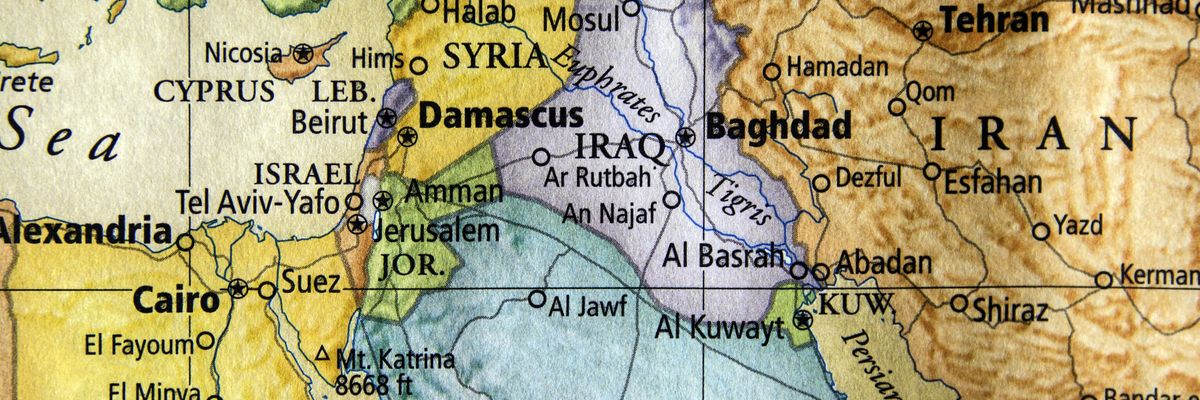UPDATE 10/25: The Pentagon is blaming Iranian-backed militias for a wave of attacks including several that were not reported earlier on Thursday and over the weekend. According to the Washington Post, in addition to the incidents below, there were attacks on Oct. 19 at Mission Support Site Euphrates in Syria, Ain al-Asad Air Base, and the Baghdad Diplomatic Support Center in Iraq, with no casualties or infrastructure damage in those incidents.
Furthermore, there were one-way drone attacks between Friday and Sunday, hitting unoccupied areas in Bashur, Iraq, and targeting Ain al-Asad and al-Tanf bases.
The military is now saying some 24 US troops have sustained minor injuries, with 20 affected in one incident, but they have since returned to work.
“What we are seeing,” said Brig. Gen. Patrick Ryder, Pentagon spokesman, “is the prospect for more significant escalation against U.S. forces and personnel across the region in the very near-term coming from Iranian proxy forces and ultimately from Iran.”
The U.S. military has been quietly reacting to a spate of drone and rocket attacks against its troops in the Middle East this week, mindful that the region has become a tinderbox and the chances for the situation slipping into a wider war are growing every day.
“Right now, this conflict is contained between Israel and Hamas, and we’re going to do everything we can to ensure deterrence in the region, so that this does not become a broader” conflict, said Pentagon spokesman Brig. General Patrick Ryder to reporters on Thursday. He added that any armed U.S. response “will come at a time and a manner of our choosing.”
He was answering questions about two missiles and several drones that were fired from Yemen and intercepted by an anti-missile system on a U.S. Navy ship in the Red Sea on Thursday. Officials say believe the drones and missiles were launched by what the New York Times called "pro-Iranian Houthis" and may have been headed to Israel. “We cannot say for certain what these missiles and drones were targeting, but they were launched from Yemen heading north along the Red Sea, potentially towards targets in Israel,” Brig. Gen. Patrick Ryder, the Pentagon spokesman, told reporters.
Meanwhile, U.S. bases in Iraq and reportedly Syria, too, have been targeted by drones that reports have suggested but have yet to be confirmed were fired by Iranian-backed militias. Though the estimated 900 troops in Syria and 2,500 in Iraq have been targeted on and off before for years, there has been an "uptick" in the last week acknowledged Ryder, and at least two of the attacks resulted in minor injuries. Here is the breakdown:
— On Wednesday, the Pentagon reported that the military had "engaged" two drones headed to the Al-Asad air base where American troops are stationed in the western part of Iraq. Both were intercepted but resulted in "minor injuries." On the same day, a third drone was "engaged" at a base in Irbil, Northern Iraq, and destroyed, and no injuries were reported.
“In this moment of heightened alert, we are vigilantly monitoring the situation in Iraq and the region,” according to a statement from U.S. Central Command “U.S. forces will defend U.S. and Coalition forces against any threat.”
— Also on Wednesday, U.S. officials reported two drones attacked the U.S. occupied base at Al-Tanf in Syria, which has taken repeated fire over the last three years. One was destroyed and the other "impacted" causing minor injuries. Another attack was reported in Northeastern Syria the same day. The Pentagon has not yet confirmed reports of a third attack in Syria that same day but said a U.S. contractor had died of a heart attack sheltering in place after a false alarm at the Al-Asad base in Iraq.
— On Thursday, sources and officials said that rockets and drones had been fired again at U.S. troops stationed at the Al-Asad base in Iraq with "multiple blasts" reportedly heard from inside the installation. Reports indicated that U.S. troops had come under attack at a base near Baghdad's international airport as well. There were few details on these fresh attacks as of Friday morning.
- Ending the Syria war, getting US troops out, and lifting sanctions ›
- US troops in Iraq & Syria with unclear mission attacked again ›
- US F-16s strike Iranian targets in Syria - Responsible Statecraft ›
- Houthi missile launches at Israel risk reigniting war in Yemen - Responsible Statecraft ›
- US troops in Iraq and Syria aren't 'keeping the peace' - Responsible Statecraft ›
- US strikes in Baghdad wipe out militia leader | Responsible Statecraft ›
- Iraqis: Don't use our country as a 'proxy battleground' | Responsible Statecraft ›
- US troops should have left Syria and Iraq long ago | Responsible Statecraft ›
- Top Iraqi security official: why can't we stop the war in Gaza? | Responsible Statecraft ›














